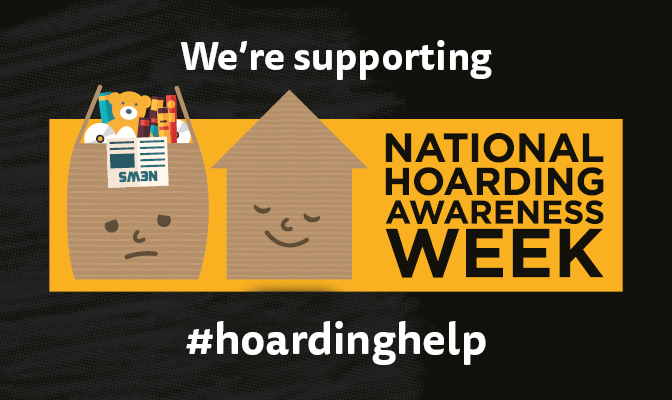
Did you know that around 1.2 million people in the UK are thought to be affected by hoarding or that at Castles & Coasts, we’re currently working with 30 residents to support them with hoarding issues?
National Hoarding Awareness Week (NHAW) began in 2014 and was devised by the Chief Fire Officers Association, which is now the National Fire Chiefs Council. The week is currently sponsored and run by Clouds End CIC.
Running from 15th to 19th May, it aims to raise awareness of the risks associated with hoarding.
What is hoarding?
Hoarding is having so many things that you can’t manage the clutter where you live and find it really hard or even impossible to throw things away. The impact of hoarding can affect people’s day-to-day life.
This week, it’s also Mental Health Awareness Week. Hoarding disorder is a mental health issue itself, and some people might also experience hoarding as part of another mental or physical health problem.
What are the signs of hoarding?
There’s lots of information on the Mind website about hoarding including signs to look out for. If you hoard, you might:
- Feel the need to get more things, even if you have a lot already
- Have very strong positive feelings whenever you get more things
- Feel very upset or anxious at the thought of throwing or giving things away because of an emotional attachment to them
- Find it very hard to decide what to keep or get rid of
- Find it hard to organise your things
- Have so many things that you can't use parts of the place you live in, like a bed or a sink
- Have lots of disagreements with the people close to you about your things
- Find it hard to pack for trips away, like a holiday – you might pack way more things than you really need, because you can't decide what's important
What are the effects and risks of hoarding?
Hoarding could affect someone in lots of different ways. You might:
- Struggle to find things you need, which can then lead to money problems and difficulty keeping up with their bills, including rent.
- Avoid letting people into your home or have trouble answering the door. This could mean Castles & Coasts colleagues find it difficult to gain access for repairs or other works.
- Not be able to leave your home quickly if there’s a fire of other emergency because of things blocking doorways or escape routes.
- Distance yourself from others or have issues with people close to them. This might be because they don't want people to know about their situation, or because they don’t feel supported.
There’s more on this on the Mind website
Self-referral if you think you might be affected by hoarding
If you think you or someone you live with might be hoarding, it’s important to find the right support. Our Tenancy Support and Safeguarding Officer has developed the referral form below for you. Please download the form (click on the arrow pointing downward, in the top left hand corner of the box below), fill it in and email it to the email address at the end of the form if you’ve recognised any of the signs above. If you're not able to do this, please call us on 0800 085 1171 and ask to speak to our Tenancy Support and Safeguarding Officer.
You can also find out more about hoarding, the potential effects and other support available here www.hoardingawarenessweek.org.uk and on Mind’s website here.



